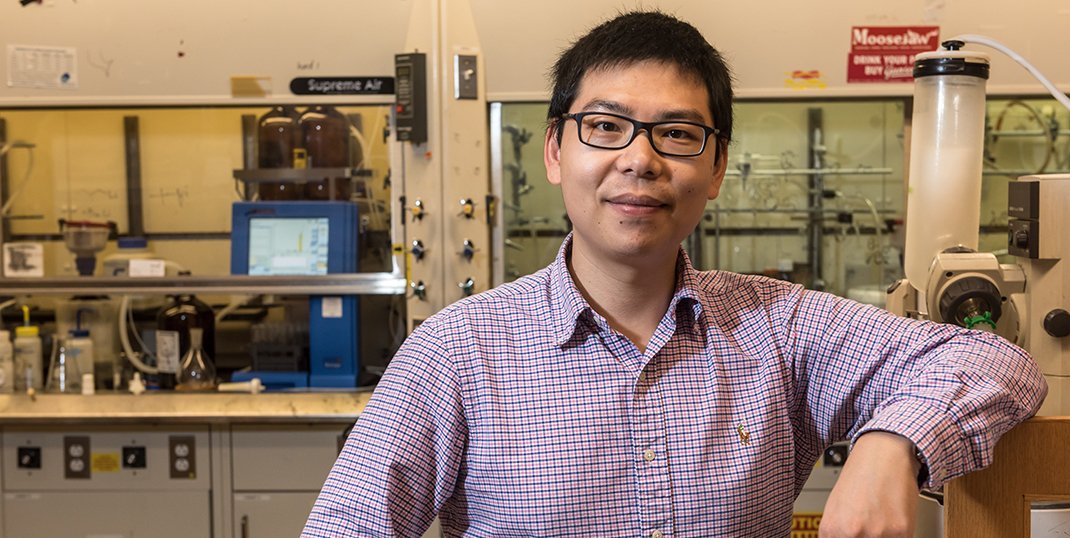Lee Pellegrini
Jia Niu, an assistant professor of chemistry at Boston College, has received a $2.3 million National Institutes of Health Director’s New Innovator Award, part of the NIH’s High-Risk, High-Reward Research Program, which funds highly innovative biomedical or behavioral research proposed by extraordinarily creative scientists, the agency announced on October 1.
“I am honored and very grateful for the generous support from NIH through the New Innovator Award, as well as to Boston College and my department for providing me opportunity and encouragement in developing my research program,” said Niu, the first BC researcher to be selected for a High-Risk, High-Reward New Innovator grant. “I would also like to thank the postdocs and graduate and undergraduate students in my group whose hard and creative work made this award possible.”
The High-Risk, High-Reward Research program catalyzes scientific discovery by supporting highly innovative research proposals that, due to their inherent risk, may struggle in the traditional peer review process despite their transformative potential, according to the NIH. Program applicants are encouraged to think in new ways and to pursue trailblazing ideas in any area of research relevant to the NIH mission.
“Each year, I look forward to seeing the creative approaches these researchers take to solve tough problems in biomedical and behavioral research,” said NIH Director Francis S. Collins, M.D., Ph.D. “I am confident the 2019 cohort of awardees has the potential to advance our mission of enhancing health through their groundbreaking studies.”
At Boston College, the Niu lab conducts interdisciplinary research centered on creating precision functional macromolecules to address the pressing needs in biomedicine, materials, and environmental sciences. Earlier this year, Niu was one of 10 researchers from across the U.S. to be named a Beckman Foundation Young Investigator, which carries with it a four-year, $600,000 grant to support the chemist’s research into sustainably-oriented polymers. He is also the recipient of a Thieme Chemistry Journals Award.
Currently, Niu’s working to develop a new platform technology for creating new sustainable polymers with precisely controlled backbone structures, thereby generating novel materials that can self-assemble, become elastic, or respond to external stimuli. With the NIH Director’s New Innovator Award, Niu said his team will expand his research agenda through the project “Development of Compact CRISPR Editors for Multiplexed Editing of Complex Gene Networks.”
“The funding from this award will support my group in a new research direction: the development of multiplexable genomic editing tools and applying them to understand the interplay of genes in a complex gene network,” Niu said. “We anticipate that the new findings coming out from these studies could provide a deeper understanding into the gene networks and their roles in disease.”
The NIH Common Fund supports a series of exceptionally high-impact, trans-NIH programs which pursue major opportunities and gaps throughout the biomedical research enterprise that are of great importance to NIH and require collaboration across the agency to succeed. The High-Risk, High-Reward Research program manages four awards, including two awards aimed specifically to support researchers in the early stages of their careers. The 93 awards this year total approximately $267 million over five years, pending available funds.
BC Professor and Chairman of the Department of Chemistry Dunwei Wang praised the selection of Niu.
“This NIH award and other honors Jia recently received highlight the creativity and promise Jia has shown as an early-stage researcher,” said Wang. “This recognition is most deserved. My colleagues and I are extremely proud of his achievements. Jia’s research in the general area of health not only contributes significantly to the strategic priority of our department, but also plays an important role in the ongoing initiatives of BC's Schiller Institute for Integrated Science and Society.”
Ed Hayward | University Communications | October 2019




